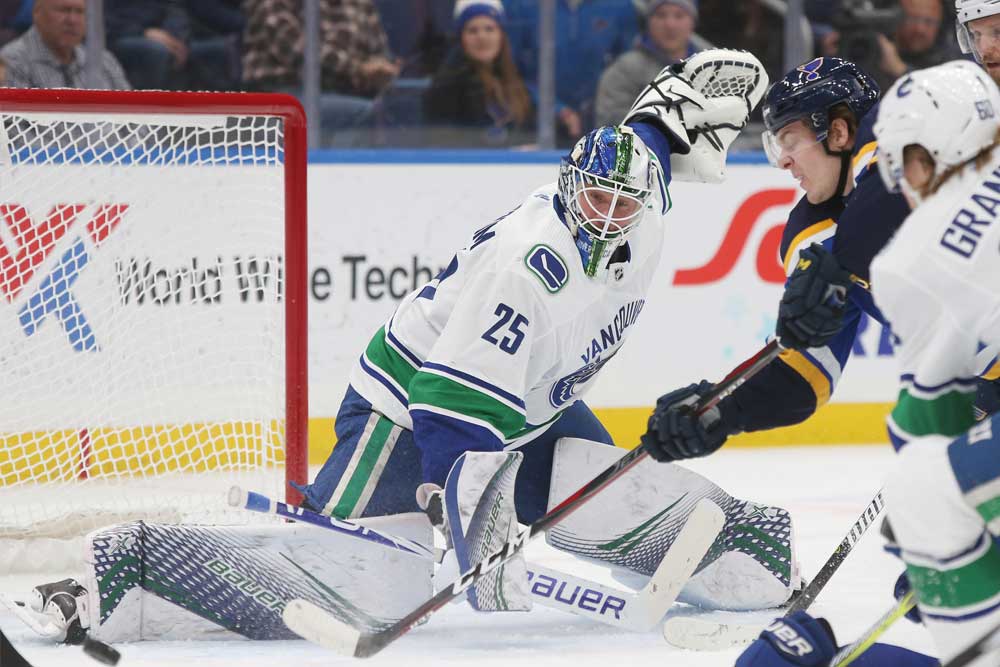Vancouver Canucks’ Rebuild on the Right Track
Game-changers are hard to come by. If you want to acquire a star, you usually have to relinquish one of your own or mortgage your future. Elite players rarely enter the free-agent pool either. That’s why the John Tavares saga over the summer was so intriguing.
With those circumstances in mind, drafting well has obviously become critical. There’s an element of guesswork involved in the process, but a team’s ability to evaluate burgeoning talent can determine its long-term outlook. The Vancouver Canucks have fared quite well in this regard — so well, in fact, that there’s a distinct whiff of hope in the air despite three straight years without playoff action.
Simply put, young stars generate a ton of excitement. In a hockey-crazed market like Vancouver, that excitement can reach full tilt in a hurry.
There’s a good reason for the buzz, though: The 20-19-4 Canucks are already better than many expected. They’re also infinitely more entertaining than in recent years. By hitting the mark on its first-round selections in 2013 (Bo Horvat), 2015 (Brock Boeser) and 2017 (Elias Pettersson), Vancouver has granted fans a taste of its promising future.
At the moment, the center of attention is 20-year-old Pettersson (42 points in 37 games). The rookie pivot is shifty and equipped with a laser beam as well as silky-smooth hands, but the defining trait in his skill set is hockey sense. He processes the game at an extremely high level, always thinking one step ahead and manipulating the opposition’s positioning to create scoring chances.
It’s not merely about picking the correct course of action. His decision-making is special because it’s lightning-quick. Though he only has a split second to make his read, it feels like he’s watching the play unfold in slow motion, dissecting defenses with no effort.
His splits provide even further cause for optimism. After a slight dip in November due in large part to Boeser’s groin injury (12 points in 14 games), Pettersson posted 17 points in 14 games during the month of December. NHL coaches now have a decent amount of tape on him, but he’s still making magic happen on a regular basis.
As Pettersson’s running mate, Boeser (28 points in 30 games) simply knows how to find the back of the net. He scored 29 goals in 62 games on the way to a Calder Trophy nomination in 2017-18 and has 14 goals through 30 games this season. The 21-year-old isn’t flashy and doesn’t necessarily drive play on his own, but his finishing ability serves as the perfect foil for Pettersson’s brilliance.
When opponents try to clamp down on the Swede, Boeser can navigate the offensive zone and find the quiet areas where he can unleash his shot. Better yet, he doesn’t need all the time and room in the world to fool goaltenders. Whether he’s one-timing passes or catching and firing them, his deceptive release is the hallmark of a natural scorer.
With that said, depth up front is vital. Boston and Colorado’s top lines are extraordinary, but who’s going to bet their house on the Bruins or Avalanche winning the Stanley Cup this year?
Bo Horvat (36 points in 43 games) is therefore a crucial piece of the Canucks’ puzzle. The 23-year-old keeps progressing from year to year and offers Vancouver a capable second line. The drop-off from the first unit isn’t so dramatic that opponents can devote all of their resources to stopping Pettersson and Boeser. Moreover, he eats the tough minutes, facing the other team’s best forwards night in and night out.
He shouldn’t be confused for a shutdown center, but he can give opposing stars enough trouble that their impact is limited to some degree. He’s worked diligently to improve his skating, and since he’s able to get to his spot more quickly, he can assert himself more often both offensively and defensively.
To be fair, there is concern along the blue line.
Chris Tanev and Alex Edler are sound in their end, whereas 24-year-old Troy Stecher is a serviceable bottom-pairing defenseman. However, the absence of a top-tier puck-mover has hurt the Canucks’ breakout and forced the team to defend for longer stretches than it should. Derrick Pouliot and Michael Del Zotto just don’t cut it. This has resulted in the 21st-ranked defense in the NHL.
Thankfully, Vancouver’s pipeline should address that issue over time as well. 2018 seventh overall pick Quinn Hughes is one of the most promising defensive prospects in the world, offering a combination of elusiveness and rare poise with the puck. He’s currently with the U.S. national team at the IIHF World Juniors, and he’s surely relishing the opportunity to make a statement on the big stage.
He’s still raw on the defensive side, but with more seasoning, he could bolster the blue line in a major way.
That long view is important here: For all his faults, general manager Jim Benning isn’t selling the farm to compete right now. He’s only brought in veterans (Jay Beagle, Antoine Roussel) this year as insulation for his young stars. They can thus learn the pro game without lofty postseason expectations and thrill fans all the while.
Beyond the big names, Jake Virtanen and the recently acquired Josh Leivo are capable top-nine forwards. 2018 37th overall pick Jett Woo plays with an intriguing blend of skill and grit on the back end. If 2016 fifth overall pick Olli Juolevi can stay healthy, he should develop into a reliable depth rearguard at the very least. There are useful players in the mix, and getting the best out of them will depend on coaching and how management surrounds them.
Of course, there’s no guarantee that these players will pan out. Frankly, there’s no guarantee that Pettersson, Boeser and Horvat can maintain their trajectories either. Affording them NHL experience against world-class opposition is invaluable, though, and the strength of their performances to this point suggests that the franchise is clearly moving in the right direction.
While Vancouver sits just two points out of a wild-card spot, it is not a very good team. It ranks 25th in CF% and 30th in SCF%. It doesn’t dictate the play and will likely struggle to keep pace as the games intensify down the home stretch…and that’s perfectly fine.
For the Canucks, success in 2018-19 has nothing to do with the standings and everything to do with laying down a solid foundation.
Recent Posts

How Corey Perry Is Making His Presence Felt With the Lightning
View Post »
How Adam Fox Pushed the Rangers Past the Penguins
View Post »

